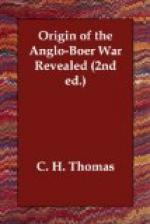Boers could walk or ride about armed to the teeth, whilst Uitlanders were forbidden to possess arms under penalty of confiscation and other punishments (except sporting-guns under special permit). The like irritations became rampant by 1890 already.
The alien population were at first too much occupied with their prosperous vocations to combine in the way of protesting against such prevailing usage. The Press was, however, eventually employed, and the Government was approached with respectful petitions praying for redress of the most glaring causes of discontent; but those were invariably either disdainfully rejected or ignored, or, if some matter was relieved, other more exasperating enactments were defiantly substituted. They were cynically told that they had come to their (the Boer’s) country unasked, and were at liberty, and in fact invited, to leave it if the laws did not please them. This was said, well knowing that to leave would involve too great sacrifices of homes and investments. The Uitlanders could not, however, be brought to the belief that the Government of a conscientious people could persist in dealing with them as if a previous design had existed—first to inveigle them and their capital into their midst, with the object of goading and despoiling them afterwards. The course of petitioning and respectful remonstrances was therefore persevered in, but all to no purpose. Indignation and resentment were the natural result of those failures. There appeared no alternative but to submit or else to abandon all and leave the country.
It is true that numerous Uitlanders acquired competences, and some were amassing fortunes, but such prizes were comparatively few. The majority just managed, with varying success, to reap a reasonable return for their outlays and energies, or only to live more or less comfortably. The fashion of luxurious and unthrifty living, so prevalent among the “nouveaux riches” and the section who vied with them, impressed the Boers with the notion that all were getting rich, and that soon there would be nothing left for them in the race. In their Hollander Press they were reminded that the gold, in reality belonging to them, was rapidly being exhausted, and the wealth appropriated by aliens, whose hewers of wood and drawers of water they would finally become. All this galled them to the heart, and the Government readily lent itself to proceedings intended to balance conditions in favour of their burghers, as the process was described. I will adduce a few instances. As is well known, it is only burghers and some privileged Hollanders who are employed in Government service, from President down to policeman. There are very few exceptions to this rule, which also applies to the nominations of jurymen, who are well paid too. The salaries of all, especially in the higher grades, had been largely augmented; the President receiving L8,000 per year, and so on downwards.




